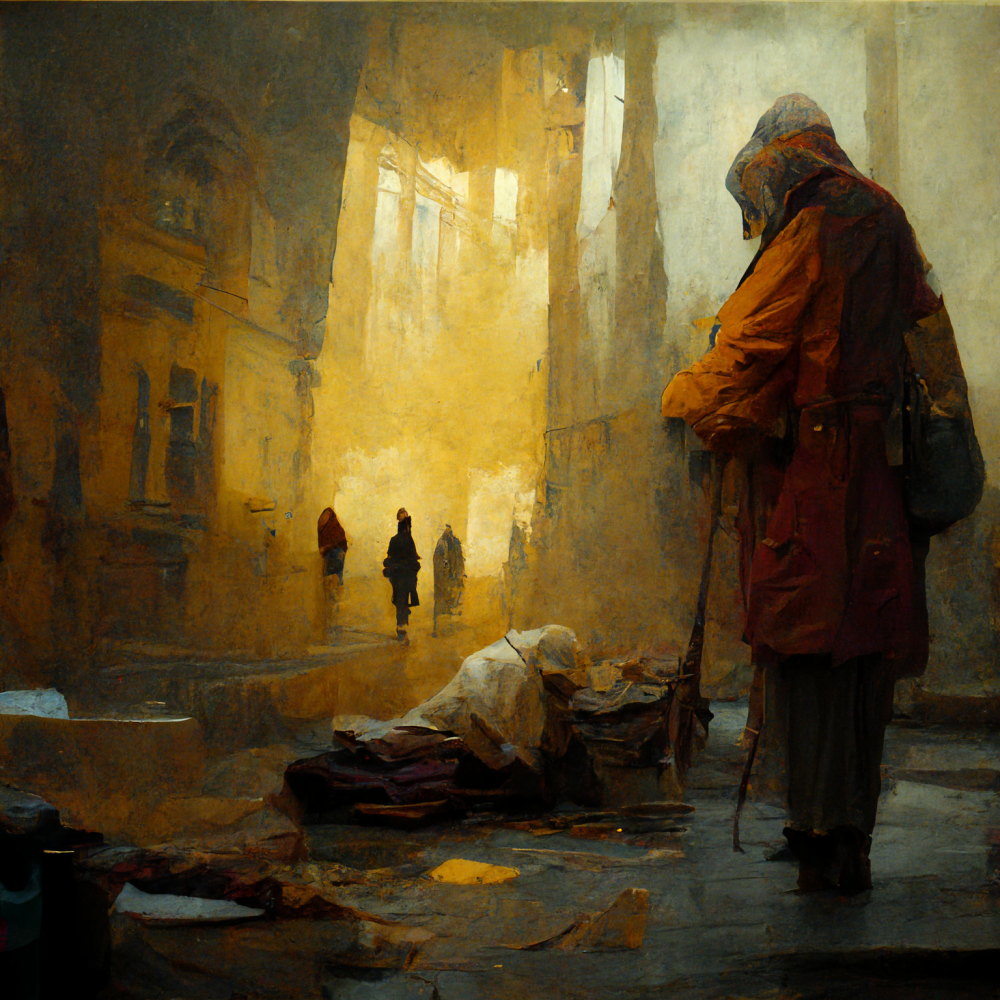Otto Büchstein: Difference between revisions
Amwelladmin (talk | contribs) No edit summary |
Amwelladmin (talk | contribs) No edit summary |
||
| (14 intermediate revisions by the same user not shown) | |||
| Line 1: | Line 1: | ||
{{a| | {{a|otto|{{image|Buchstein in Mandalay|png|“''Die letzte Kommission''” (“''The Final Commission''”, also known as ''The Last Patron''), [[Birgit von Sachsen-Rampton|von Sachsen-Rampton’s]] aching rendition of Büchstein’s final days, in a hallucinogenic stupor, in Mandalay}}}}Apocryphal Austrian playwright. m. [[Birgit von Sachsen-Rampton]]. Headstrong daughter called [[Antagonista Contrariana]]. Wrote a widely ignored philosophical tract, [[Discourse on Intercourse]], which posited that the most fundamental essence of human nature was to form a committee. [[Convenimus ergo es]] — literally, “[[We are meeting, therefore you exist]]”. | ||
Known to operate ''sub nom'' [[Jolly Contrarian]], on whom he based his first {{tag|opera}}. It is understood that his character [[Don Iolio Contrario]] from ''[[La Vittoria della Forma sulla Sostanza|Form and Substance]]'' is also loosely autobiographical. | Known to operate ''sub nom'' [[Jolly Contrarian]], on whom he based his first {{tag|opera}}. It is understood that his character [[Don Iolio Contrario]] from ''[[La Vittoria della Forma sulla Sostanza|Form and Substance]]'' is also loosely autobiographical. | ||
Wrote the justifiably under-appreciated operettas ''[[der Glücklich Widersprüchlichmensch]]'' (“The [[Jolly Contrarian]]”), ''[[Die Warteschleifenmusikopfer]]'' (“The hold-music victim”) | Wrote the justifiably under-appreciated operettas ''[[der Glücklich Widersprüchlichmensch]]'' (“The [[Jolly Contrarian]]”), ''[[Die Warteschleifenmusikopfer]]'' (“The hold-music victim”), his {{br|Form und Substanz}} cycle (comprising ''[[Der Sieg der Form über Substanz]]'' (“The Triumph of Form over Substance”) (more usually known, and performed, in Italian as ''[[La Vittoria della Forma sulla Sostanza]]'') and {{br|Talentdämmerung}} (“Twilight of the Subject Matter Experts”)). There is a theory that the harrowing final scene of {{br|Talentdämmerung}}, involving a [[Crisp-packet blowing across St Mark’s square|crisp packet blowing across St Mark’s square]], was formative on the young William Shakespeare. | ||
There are rumoured to be other unfinished operas and librettos that the author feverishly scribbled down in his final days. Fragments have recently been uncovered courtly heroic saga of ISDA knights, {{br|Ser Jaramey Slizzard}}, and there are larger extant sections of ''[[Die Schweizer Heulsuse]]'' (the “[[The Swiss Milquetoast|Swiss Milquetoast]]”), supposedly commissioned by a mysterious patron as [[Büchstein]] lay dying in a hospital bed in [[Mandalay]], afflicted with dengue fever<ref>Or possibly malaria.</ref>. The identity of the mysterious patron has never been uncovered — [[Büchstein]]’s facility for prevarication is well known, and he may well have just made it up — but popular theories have circulated that it was {{jerrold}}, or {{buchstein}}’s life-long antagonist [[Winthrop Grumman]]. If you know anything about it, please get in touch! | |||
{{sa}} | {{sa}} | ||
*[[Otto’s razor]] | |||
*''[[Der Glücklich Widersprüchlichmensch]] | *''[[Der Glücklich Widersprüchlichmensch]] | ||
*''[[ | *''[[Der Sieg der Form über Substanz]] | ||
*''[[Die Warteschleifenmusikopfer]]'', (Op. 27, No. 2) | *''[[Die Warteschleifenmusikopfer]]'', (Op. 27, No. 2) | ||
*''[[Die Schweizer Heulsuse]] (unfinished) | *''[[Talentdämmerung]]'' | ||
*''[[Ser Jaramey Slizzard]]'' (fragment) | |||
*''[[Die Schweizer Heulsuse]]'' (unfinished) | |||
{{ref}} | {{ref}} | ||
{{c|Fictional heroes}} | |||
Latest revision as of 10:25, 4 July 2023
|
The complete works of Otto Büchstein
|
Apocryphal Austrian playwright. m. Birgit von Sachsen-Rampton. Headstrong daughter called Antagonista Contrariana. Wrote a widely ignored philosophical tract, Discourse on Intercourse, which posited that the most fundamental essence of human nature was to form a committee. Convenimus ergo es — literally, “We are meeting, therefore you exist”.
Known to operate sub nom Jolly Contrarian, on whom he based his first opera. It is understood that his character Don Iolio Contrario from Form and Substance is also loosely autobiographical.
Wrote the justifiably under-appreciated operettas der Glücklich Widersprüchlichmensch (“The Jolly Contrarian”), Die Warteschleifenmusikopfer (“The hold-music victim”), his Form und Substanz cycle (comprising Der Sieg der Form über Substanz (“The Triumph of Form over Substance”) (more usually known, and performed, in Italian as La Vittoria della Forma sulla Sostanza) and Talentdämmerung (“Twilight of the Subject Matter Experts”)). There is a theory that the harrowing final scene of Talentdämmerung, involving a crisp packet blowing across St Mark’s square, was formative on the young William Shakespeare.
There are rumoured to be other unfinished operas and librettos that the author feverishly scribbled down in his final days. Fragments have recently been uncovered courtly heroic saga of ISDA knights, Ser Jaramey Slizzard, and there are larger extant sections of Die Schweizer Heulsuse (the “Swiss Milquetoast”), supposedly commissioned by a mysterious patron as Büchstein lay dying in a hospital bed in Mandalay, afflicted with dengue fever[1]. The identity of the mysterious patron has never been uncovered — Büchstein’s facility for prevarication is well known, and he may well have just made it up — but popular theories have circulated that it was Sir Jerrold Baxter-Morley, K.C., or Büchstein’s life-long antagonist Winthrop Grumman. If you know anything about it, please get in touch!
See also
- Otto’s razor
- Der Glücklich Widersprüchlichmensch
- Der Sieg der Form über Substanz
- Die Warteschleifenmusikopfer, (Op. 27, No. 2)
- Talentdämmerung
- Ser Jaramey Slizzard (fragment)
- Die Schweizer Heulsuse (unfinished)
References
- ↑ Or possibly malaria.
